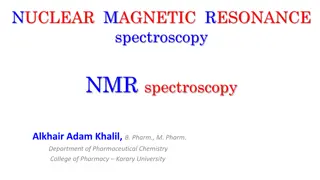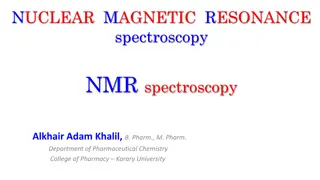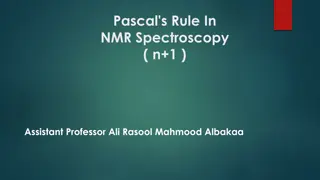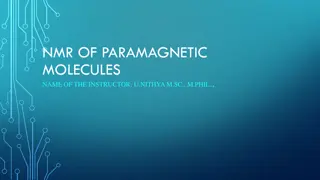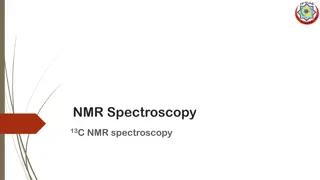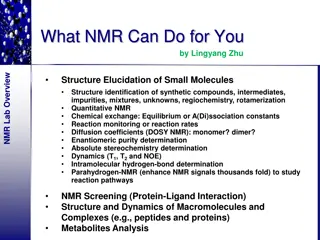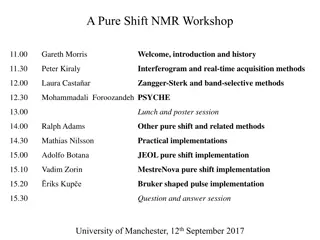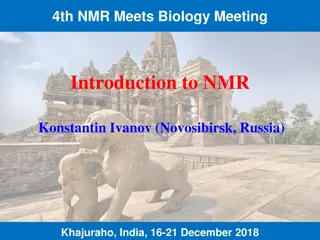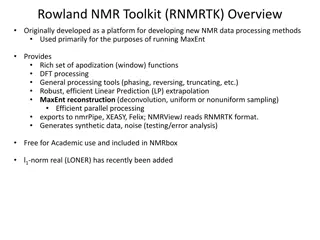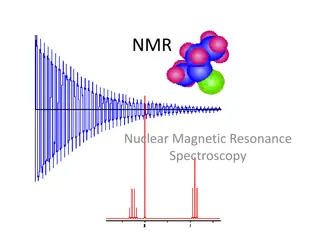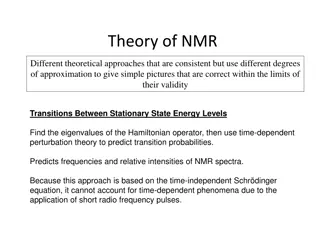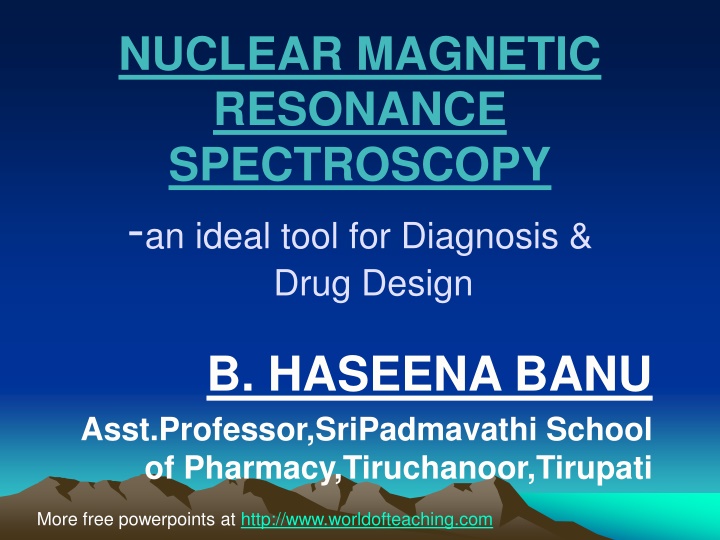
Nuclear Magnetic Resonance Spectroscopy in Diagnosis and Drug Design
Explore the applications of Nuclear Magnetic Resonance (NMR) spectroscopy in medicine, including its role in diagnosis and drug development. Learn about the basic principles, various techniques, and clinical applications of NMR imaging in different body regions. Discover how NMR is used to distinguish tissue types, detect abnormalities, and evaluate organ function with precision.
Download Presentation

Please find below an Image/Link to download the presentation.
The content on the website is provided AS IS for your information and personal use only. It may not be sold, licensed, or shared on other websites without obtaining consent from the author. If you encounter any issues during the download, it is possible that the publisher has removed the file from their server.
You are allowed to download the files provided on this website for personal or commercial use, subject to the condition that they are used lawfully. All files are the property of their respective owners.
The content on the website is provided AS IS for your information and personal use only. It may not be sold, licensed, or shared on other websites without obtaining consent from the author.
E N D
Presentation Transcript
NUCLEAR MAGNETIC RESONANCE SPECTROSCOPY -an ideal tool for Diagnosis & Drug Design B. HASEENA BANU Asst.Professor,SriPadmavathi School of Pharmacy,Tiruchanoor,Tirupati More free powerpoints at http://www.worldofteaching.com
CONTENTS INTRODUCTION BASIC PRINCIPLE DIFFERENT TECHNIQUES APPLICATIONS OF NMR IN MEDICINE CLINICAL APPLICATIONS IN DIAGNOSIS DRUG DEVELOPMENT NMR Nobel prize laureates
INTRODUCTION BASIC PRINCIPLE IN NMR Atomic nuclei tiny magnets In external magnetic field - allign or oppose If irradiated with EMR of proper frequency Resonance o PARAMETERS Chemical shifts Spin lattice relaxation time
DIFFERENT TECHNIQUES Based on nuclei H1 NMR C13 NMR F13 NMR & P31 NMR N15 NMR & O17 NMR CWNMR FTNMR 2D_NMR &3D_NMR COSY _CORRELATION SPECTROSCOPY MRI_MAGNETIC RESONANCE IMAGING ESR_ELECTRON SPIN RESONANCE SPECTROSCOPY
APPLICATIONS OF NMR IN MEDICINE CLINICAL APPLICATION OF PROTON IMAGING IN DIAGNOSIS BRAIN Distinguishing gray matter & white matter Imaging posterior fossae, brain stem, spinal cord Detect demyelinating lesions, tumors, hemorrhages, infarctions
ABDOMEN o Metabolic liver disease o Measures liver iron over load in hemochromatosis o Focal areas of inflammation in chronic active hepatisis KIDNEYS o Distinguishing renal cortex & medulla o To evaluate transplanted kidney PELVIS o Differentiates between Benign prostatic hyperplasia & prostatic carcinoma o Detects bladder tumours
MEDIASTINUM, HILUM, LUNG o Assessing abnormalities o Respiratory gating HEART o Tomographic images of heart muscle, chambers, valvular structures o ECHO-PLANAR TECHNIQUE o Discrimination between infarcted, ischemic & normal myocardium BREAST o 3D-NMR & single-slice planar imaging in detecting breast abnormalities
MUSCULO SKELETAL SYSTEM Demonstrates Osteo myelitis, tumor metastasis in vertebral bodies & pelvic bones Images of muscles, tendons, ligaments BLOOD VESSELS & FLOW Atherosclerotic vascular disease Assess blood flow in major vessels. INVIVO SPECTROSCOPY Chemical shift phenomenon Diagnosis of rare disease to inborn errors- Mc Ardle s syndrome INVIVO Analysis of Bone flouride content.
PUTTING NMR IMAGING INTO PERSPECTIVE Eliminates risk of x-radiation Excellent spatial & contrast resolution Detecting diseases at earlier stages
NMR IN PHARMACEUTICAL RESEARCH Leading technology for 3-D structure determination of bio-macromolecules Studying protein structure SAR by NMR Novel lead compounds Chemical shift mapping Structural information on the binding modes and site positions Molecular dynamics, conformational analysis SHAPES NMR SOLVE
Structural genomics Identifying gene products in disease Targets of drug design. Development of Novel drug delivery systems Enhancing HTS assays Thousands of compounds Cryogenic NMR technology / cryoprobes
NMR Nobel Prize Laureates The Nobel Prize in Physics 1943, Ohostern, USA Discovery of magnetic moment of proton The Nobel Prizein Physics 1952- IsidorJ. Rafi,USA Discovery of new methods for nuclear magnetic precision The Nobel Prize in Chemistry 1991 Felix Bloch, USA and Edward M. Purcell, USA Methodology of high resolution NMR. The Nobel Prize in Chemistry 2002 Kurt Wuthrich, Switzerland Determining 3-D Structure by NMR. The Nobel Prize in Medicine 2003 Paul C. Lauterbur, USA and Peter Mans field, U.K. Discoveries concerning MRI.

